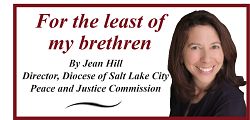State Legislative Session Ends with Few Gains for Culture of Life
The 2022 Utah State legislative session began with great promise for building a culture of life, but ends without advancing as far as we hoped.
The most disappointing failure this session was the unwillingness of a legislative committee, the first stop for most legislation, to allow the full chamber to debate repeal and replacement of the death penalty.
The committee hearing on the issue demonstrated much of what is wrong with capital punishment. During the hearing, the Utah attorney general’s office dredged up every horrific detail it could about past murder cases to inflame the discussion. Then, it paraded family members through the public comment portion to relive, once again, the pain and suffering they have endured for decades under the false promises of prosecutors that death of the perpetrator is the only way to bring them justice.
The desire for vengeance by family members is understandable and human. But it is exploitative for prosecutors to continue to stoke that flame of revenge for years and years to maintain a barbaric and unnecessary system of punishment. It is natural to want revenge, it is unnatural to kill, even when government is the actor and even if the person being killed has shown a wanton disregard for life.
During the next several months, we will engage in more focused advocacy with the attorney general’s office to share our concerns that when prosecutors choose to seek a death sentence, they should do so understanding that they are thus sentencing the victim’s families to a lifetime of unabated rage and public reminders of the horrors their loved one endured. If Utah insists on maintaining the fiction that it will take the life of the “worst of the worst,” any family that wants a death sentence should be fully informed by the prosecutor of what that means, including the years of hardship ahead and the likelihood that the sentence will never be carried out.
The beginning of the session also brought great hope that Utah would make a substantial investment into deeply affordable housing and wrap-around services to help move people more quickly out of homelessness and help our homeless resource centers function as intended. Within our faith, housing is a core requirement for maintaining a life of dignity, and lack of shelter has clear detrimental impacts on the sanctity of life. The effort to increase the stock of affordable housing was a diocesan priority.
While talk before and throughout the session showed widespread support across the state for Governor Spencer Cox’s request to spend $228 million of federal American Rescue Plan funds on housing, the final numbers will be far short of that goal. At the time of writing, legislators had committed only $70 million to address our growing housing crisis.
Legislators did make some strides to care for creation, recognizing the need to address the degradation of the Great Salt Lake, and engaging in good debates around effective water conservation measures, including metering for secondary water. At the same time, however, they also continued to prioritize increased oil and gas consumption over other, less damaging energy sources. We will continue to urge legislators to address carbon fees, water metering and free mass transit proposals during interim committee meetings that happen monthly until the next formal legislative session in 2023.
We are grateful that legislators again defeated proposals to legalize assisted suicide in the state. While touted as compassionate care, these proposals provide false comfort while taking attention from much needed reform of our health care system to better address the mental health needs of people with terminal illnesses.
In the coming months, the Diocese of Salt Lake City will continue advocacy efforts at the legislature around care of creation and creating a culture of life for our poorest residents and with the attorney general’s office to address the many flaws of the death penalty. We encourage Utah Catholics to join us in fostering a culture of life in our state.
Jean Hill is the Diocese of Salt Lake City legislative liaison. She can be reached at jean.hill@dioslc.org.
© Copyright 2024 The Diocese of Salt Lake City. All rights reserved.


Stay Connected With Us